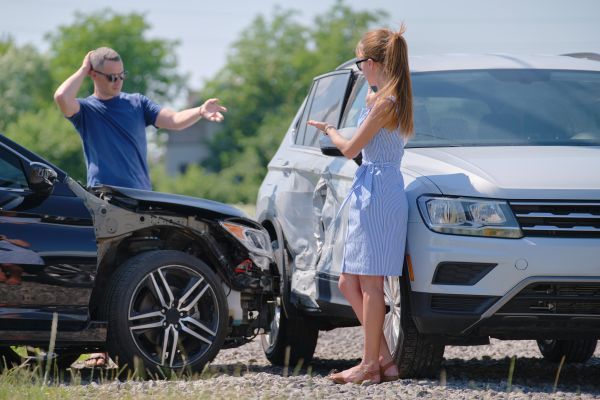What Type of Attorney Do You Call If You’re Injured in a Car Accident?
When you’re injured in a car accident, life can feel like it has been turned upside-down. One moment, everything is normal, and the next, you’re dealing with a damaged vehicle and insurance adjusters. Injuries add an extra layer of complication to the aftermath of a car accident, with doctor’s visits, medical bills, and even more insurance company involvement. It’s a lot to handle, but you don’t have to do it alone. You can hire an attorney to represent you.
Specifically, if you’ve been injured in a car accident, you should call a personal injury attorney. Different types of lawyers specialize in different types of cases, and it’s to your benefit as a client to always choose an attorney who is experienced in the field you need. They’ll have the knowledge and know-how to best assist you with your particular case.
Below, we’ll explain why an experienced personal injury attorney is the right option if you’ve been injured in a car accident.
Demonstrate Appropriate Knowledge and Connections
When someone’s careless actions cause harm, in a vehicle or other accident, personal injury attorneys are the ones who help hold people and companies accountable. They know how to read accident reports, understand insurance contracts, and negotiate with insurance companies. They understand common injuries and can read medical records. Their connections tend to be made up of medical providers, accident reconstruction experts, and other relevant professionals.
Personal injury attorneys also recognize what your claim might actually be worth—not just what an insurance adjuster says it’s worth. In Oregon, understanding how fault is divided between parties after an accident is particularly important because it can affect how much compensation you receive.
When you’re hurt and trying to recover, it’s tempting to accept whatever settlement is offered, just to end the stress. But insurance companies’ compensation offers are typically minimized as much as possible, which could cause more stress later on if further treatment is required and you’ve run out of funds.
Having someone trustworthy and knowledgeable in your corner means you don’t have to guess whether a settlement offer is fair or what steps need to be taken. You don’t have to let anyone rush you. A personal injury lawyer makes sure your voice isn’t lost in the system.
Skilled at Accident Investigation
When you’re injured in a car accident, it’s easy to think that the facts will speak for themselves. In reality, accidents can get messy and confusing. Stories change over time. Tire marks fade. Damage is repaired. People forget what they saw—or flat-out lie. When a personal injury lawyer steps in early in the process, they can help preserve the truth while it’s still clear.
A careful investigation begins with gathering accident reports, witness statements, medical records, photos, and sometimes video footage. Then the evidence is analyzed, piecing together what happened in a way that can stand up to scrutiny. Attorneys might consult with a variety of experts to ensure they understand everything there is to know about your case.
Experienced in Pursuing Compensation
The cost of a car accident injury isn’t just the first trip to the emergency room. There may be follow-up appointments, physical therapy, hours of missed work, unavoidable lifestyle changes, and so on. While some injuries immediately change how you live day-to-day, others take time to show their full impact. An experienced personal injury attorney will help you get the compensation you deserve.
You might get an offer that seems decent on the surface, enough to fix your car, maybe cover current medical bills, but without someone experienced looking closer, it’s hard to know what’s missing. Is there a possibility of future doctor or therapy appointments? Have your injuries caused long-term or even permanent damage that requires further expenditures or accommodations? Are there lost wages (past and future) that need to be accounted for?
A personal injury lawyer looks at the complete picture, calculates what your recovery may truly cost, including future care, lost income, and the emotional weight of what happened. Don’t let someone else’s negligence shrink the value of what you’ve lost.
When your attorney builds your claim, they do it with purpose. Every document, every report, and every testimony comes together to tell your story in a way that insurance companies and courts can’t brush aside.
Adept at Negotiations
Many people incorrectly assume that insurance companies will handle things fairly if you’re injured in a car accident. After all, that’s why you pay for insurance, isn’t it? The reality is often much less comforting. Insurance companies often strive to protect their own interests first, and that usually means paying you as little compensation as possible.
A personal injury attorney steps in and changes the conversation. They understand the full breadth of the costs of your injuries and make sure you’re not pressured into agreeing to something that doesn’t actually help you rebuild your life. An experienced attorney understands how to use facts, records, and laws to keep the playing field even. That’s often when insurance companies start taking the situation more seriously.
Plus, instead of you fielding calls, answering questions, and feeling cornered, your lawyer takes on that burden.
Give Yourself Peace of Mind
There’s much more at stake than just paperwork or courtroom presentations. If you’ve been injured in a car accident, there’s a weight you carry every day: stress, uncertainty, and endless questions that don’t seem to have clear answers. That can wear a person down faster than they realize. When you have a personal injury lawyer handling your case, you are no longer the one chasing phone calls, gathering evidence, or trying to decipher legal language. You have an expert to help you take on the burden.
Unfortunately, your life doesn’t pause just because you’ve been injured in a car accident. Bills still come. Work still calls. Responsibilities don’t disappear. That’s why having the right legal support isn’t just helpful; it can change the way you manage the months ahead. The experienced personal injury attorneys at Warren Allen LLP are dedicated to helping people find their balance again after an injury. We make sure the deadlines are met, the facts are protected, and your claim isn’t ignored. That lets you focus on your healing, on your health, and on the people who care about you.



